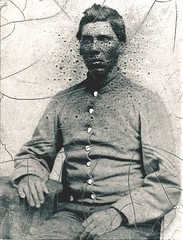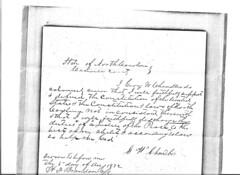My great-great-grandfather was Private George W. Chandler. He was born Jan. 4, 1832, the son of Pleasant and Martha Chandler. He was married to Elizabeth Ligon Boswell on Nov. 5, 1857. They owned land, lived and reared their nine children, died and were buried on a periwinkle-covered knoll overlooking their ancestral homestead near Milton, North Carolina. George was a farmer most of his life.
On July 8, 1862, at the age of 28, George enlisted in the Confederate army. George and many of his friends and kinfolk joined the 4th N.C. Cavalry, Company B at the Caswell County Court House in Yanceyville. He survived skirmishes and engagements with the Federal army in eastern North Carolina and southern Virginia battles. He spent the last year of the war defending the capital of Richmond and Petersburg and was with General Lee’s retreat from Richmond heading westward, finally surrendering at Appomattox. The 4th N.C. Cavalry (Roberts Brigade) has the distinction of capturing the last Federal artillery battery there at Appomattox on the morning of their surrender — as in the popular phrase describing the distinguished North Carolina Confederate soldier: “First at Bethel, farthest to the front at Gettysburg and Chickamauga and last at Appomattox.”
In 1872, he was chosen Justice of the Peace. He died suddenly at his home on March 30, 1893. The cause of his death was believed to be chronic hepatitis, which he had contracted during the war. In closing, perhaps his obituary from the Milton Chronicle describes George W. Chandler best: “He was an excellent citizen and neighbor of Caswell County and a faithful member of the Presbyterian Church.”


